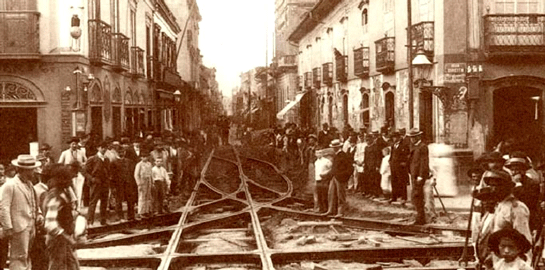A enunciação da cidade: práticas discursivas sobre a São Paulo do início do século XX
The city enunciation: discourse practices about São Paulo at the beginning of XX century

[André Luiz Joanilho, Mariângela Peccioli Galli Joanilho]
* Professor Associado do Departamento de História da Universidade Estadual de Londrina (UEL), Doutor em História - UNESP (1996).
**Professora Adjunto e Chefe do Departamento de Letras Vernáculas e Clássicas da Universidade Estadual de Londrina (UEL).
Endereço da UEL: Universidade Estadual de Londrina - Campus Universitário - Cx. Postal 6001 - CEP 86051-990 - Londrina-PR Fone: (43) 3371 4000 Fax: (43) 3328 4440
**Professora Adjunto e Chefe do Departamento de Letras Vernáculas e Clássicas da Universidade Estadual de Londrina (UEL).
Endereço da UEL: Universidade Estadual de Londrina - Campus Universitário - Cx. Postal 6001 - CEP 86051-990 - Londrina-PR Fone: (43) 3371 4000 Fax: (43) 3328 4440
-
---------------------------------------------------------------------------------------
-
Para citar essa obra:
JOANILHO, André Luiz; JOANILHO, Mariângela Peccioli Galli. A enunciação da cidade: práticas discursivas sobre a São Paulo do início do século XX. RUA [online]. 2010, no. 16. Volume 1 - ISSN 1413-2109/e-ISSN 2179-9911
Resumo:
O estabelecimento do espaço urbano da cidade de São Paulo no início do século XX instaura a abertura de um amplo campo de estudos para a compreensão das práticas discursivas que se estabeleceram sobre a cidade no momento em que ela própria se constituía. Com a expansão física da cidade, foi possível estabelecer instituições novas: o Instituto Pasteur, o Instituto Vacinogênico, o Instituto Bacteriológico, a Faculdade de Medicina e Cirurgia, a Escola Normal, para citar algumas. Estas instituições promoveram o ideário cientificista e passaram a atuar no sentido de estabelecer práticas ligadas aos ideais higiênicos da época, como também, estimularam as discussões sobre o sujeito brasileiro, e instilaram ideias nacionalistas através de intensa propaganda. Permitiram um campo de atuação para a elite educada na cidade, fechando, de certa maneira, o circuito fazendeiros/educação/atividades urbanas. O ideário cientificista e a educação formal passaram a fazer parte das marcas de distinção de classe do lado da elite, que, pelo menos para parte dela, encontrou nas instituições urbanas um campo de atuação nas suas atividades além da política. O trabalho, a moral, a higiene, as habitações, o nacionalismo, a educação, passam a ser temas dessa elite cientificista. Neste sentido, a capital paulista, se torna o campo privilegiado para a aplicação de práticas discursivas que visam o controle e a conformação dos indivíduos. Estas práticas, por sua vez, constituem-se de enunciados que têm origem em locais diversos e se correlacionam (biologia, educação, nacionalismo, etc.).
Palavras Chave: discursivas; discurso; cidade; urbanismo
Abstract:
The establishment of the urban space of São Paulo at the beginning of XX century restores the opening of an great field of studies for the understanding of discourse practices that were established about the city at the same moment which it was built. With the physical expansion of the city, it was possible to establish new institutions: the Pasteur Institute, the Vaccines Institute, the Bacteriological Institute, the College of Medicine and Surgery, the Normal School, to cite some of them. These institutions had promoted the scientific ideas and had started to act in the direction to establish practical on the hygienic ideals of the time, as well as, had stimulated the quarrels on the Brazilian and establish nationalistic ideas through intense propaganda. They had allowed a field of performance for the elite educated in the city, closing, in certain way, the circuit farmers/education/urban activities. The scientific ideas and the formal education had got to be part of the class marks distinction of the elite, which, at least for part of it, found in the urban institutions a performance field in its activities beyond the politics. In this sense, the city is the privileged field for application of these ideals and subjects. São Paulo becomes the privileged field for the application of discourse practices that aim at the control and the conformation of the individuals. These practices consists of enunciated that have origin in several places that are correlated (biology, education, nationalism, etc.).
Keywords: Discourse practices; discourse; city; city planning

